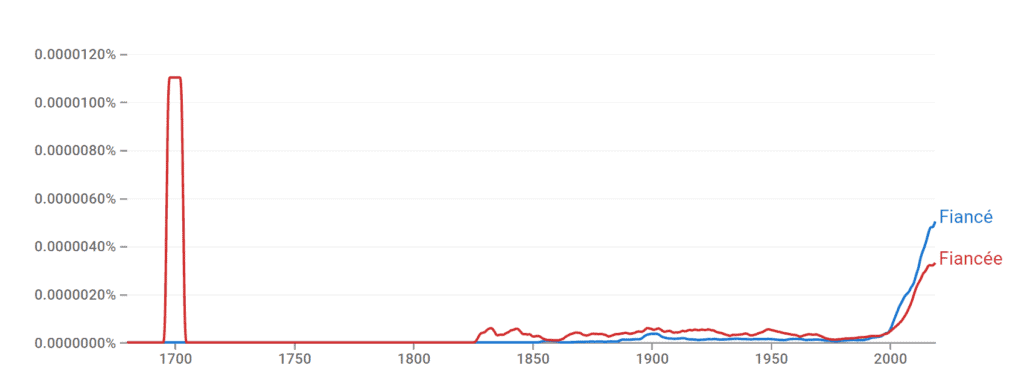Romance languages always make everything pertaining to love sound so exotic, and unsurprisingly many words are used in their original form in English as well. After all, how can one improve upon perfection?
Fiancé (or is that fiancée?) is one such word meant to convey the engagement between two people. Although its use is attributed to the French, it actually has Latin roots. But, which is it? Fiancé or fiancée?
Let’s look at the differences between fiancé and fiancée and explore where the term originated.
Fiancé vs. Fiancée: What’s the Difference?
A fiancé is a man engaged to be married. A fiancée is a woman engaged to be married. Both words come directly from French and often retain the accent aigu (also called an acute accent) over the first e—though the accent appears less and less frequently in English.
The pronunciation of fiancé and fiancée are exactly the same as well, hence why they are so often confused in English or even somewhat misused when the last “e” in the feminine version is dropped (more on that below).
History and Origins of Fiancé and Fiancée
The French adapted the Latin fidere, meaning to trust; into the Old French word fiance, meaning a promise; and the verb fiancer, meaning to become betrothed or engaged to be married in modern French.
Both Latin and French apply gender forms to many nouns, explaining the extra “e” added to the feminine version of the word to distinguish it from the masculine form.
With the adaptation to the English language, there has been a more constant dropping of the second “e,” making it a more neutral word that embraces both genders or those who prefer not to use them.
With many educated British schooled in the French language, the term became introduced to the English. Although it was dropped from use in the American colonies during the mid-18th Century, it was introduced again during the 19th Century. During this time, America and Britain mended alliances following the Revolutionary War period with an opening of trade and education between the two countries.
Ngram: American English Use of the Words Fiancé and Fiancée
When to Use Fiancé and Fiancée
If you want to use the word correctly, use fiancé to describe a man who is promised to get married and fiancée to describe a woman who is promised to get married.
It is acceptable in American English to drop the second e and the accent mark without losing meaning or understanding from your audience. It also can be used as fiance to be more gender-neutral language.
If you are tired of the fiancé vs. fiancée debate surrounding its correct use, try using spouse to be, intended, partner, or affianced, meaning to become engaged instead.
Fiancé vs. Fiancée Used in a Sentence
Kris is delighted his fiancée is pleased with the band, explaining he had one clear goal in mind when buying it. [Stuff.co.nz]
Six weeks ago, she and her fiancé moved with their five kids from a house in the southwest part of Slave Lake to a place in the southeast. [Toronto Star]
After a gentle jibe from his blonde fiancée, Cindy, about his ‘big old saggy chin’, the 59-year-old from Virginia decided to do something about it. [Daily Mail]
CPS officials said Ferguson is planning to get married and is moving to the suburbs with her fiancé. [Chicago Tribune]
Let’s Review
In French, feminine and masculine forms of nouns are integrated into pronunciation and spelling. Although both fiance forms are pronounced the same, fiancé is used to describe a man promised to marry. Fiancée is used to describe a woman promised to get married.
The Americanized usage of the word allows the drop of the second e and the accent mark without losing meaning or context.


